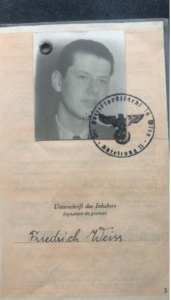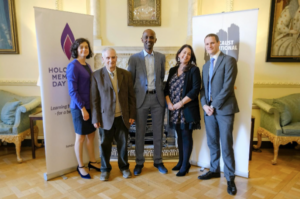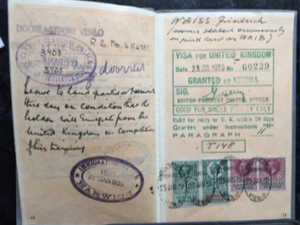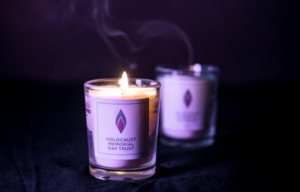Michael Livingston reflects on how the UK Government saved his grandfather from persecution, and why marking Holocaust Memorial Day is more important than ever, especially for those serving the public.

On 31 January 1939, Friedrich (Fred) Weiss landed at Harwich in Essex to start his new life in the UK. Already 17, he was too old to be an official Kindertransport refugee, but travelled here with many of them from his home in Austria, fleeing Nazi persecution. Originally granted temporary leave to enter, he latterly became a British citizen, setting up a successful furniture business in Glasgow, marrying and raising his family there.
In 2019, one day short of 80 years after his arrival, 10 Downing Street held a Holocaust Memorial Day commemoration, hosted by his grandson – me. Colleagues at the very centre of Government heard the testimony of a Holocaust survivor, Steven Frank, alongside one from Eric Eugene Murangwa, a survivor of the Rwandan genocide (and, incidentally, a former international footballer).

The UK’s annual Holocaust Memorial Day was established by the Government in 2001 and takes place on 27 January - this year, marking the 79th anniversary of the liberation of the Auschwitz-Birkenau death camp. It remembers the millions of people killed in the Holocaust, Nazi Persecution and in subsequent genocides in Cambodia, Rwanda, Bosnia, and Darfur. In 2024, this coincides with the thirtieth anniversary of the Rwandan Genocide.
Remembering is more important than ever. People often invoke the platitude ‘never again’, but the point is that it has happened again in those more contemporary genocides. Hate continues to destroy and divide communities – right now, we are seeing massively increased levels of antisemitism and anti-Muslim hatred on the streets of the UK. It damages the most vulnerable, and it undermines the fabric of society.
And, yet, little more than ten years ago, the day was hardly marked at all in most Government departments. Spurred by this realisation, I worked with a group of inspirational colleagues across the Civil Service to build an HMD Champions network. And, in 2024, we now have almost thirty events taking place across every major Government department, as well as many of our agencies and arms’ length bodies.

Over the years, tens of thousands of civil servants – and countless Ministers – have joined our events, in person and virtually, to hear from a broad range of speakers. Most importantly, this includes survivors of the Holocaust. With each passing year, the opportunities to hear a survivor grow ever fewer. Those of us who have had that privilege bear an almost sacred responsibility to take up that mantle.
Because acts like these can’t simply be perpetrated by individuals - they rely on an organised, state-sponsored regime. So it is crucial for those of us in government to hear these testimonies, and to learn the lessons. Those lessons are uniquely powerful, can shape our world view, and continue to be key to so many of the things for which we are responsible.
Whether that is colleagues in FCDO and MOD seeking to bring and maintain peace around the world, the Home Office granting leave to those fleeing persecution, DLUHC building bridges between communities, or DfE ensuring that the next generation understand the mistakes of the past – wherever you are in Government, the impact of hearing a survivor’s story will add value to what you do.
This year’s HMD theme is the Fragility of Freedom and there is a varied programme of events already underway across departments. There are more details here, where you can also sign up for the whole-of-Government event being broadcast at 1pm on Friday 26 January to hear the testimony of Holocaust survivor Janine Webber BEM.
As we mark Holocaust Memorial Day 2024, I leave all Civil Service colleagues with a call to action:
- Join a commemoration and hear from a survivor – there can be no more impactful way of spending your time.
- Tell others what you have heard - as Elie Wiesel said, ‘when you listen to a witness, you become a witness.’
- Light a candle in your window at 8pm on Saturday 27 January as part of a national moment of commemoration.


5 comments
Comment by Simone posted on
Thank you for sharing and reminding us of why this is important. I'd like to also mention the Armenian genocide which is rarely mentioned - this served as justification for the Holocaust precisely because they were forgotten.
Comment by Ian Ascough posted on
Thank you, Michael, for sharing your family's story and for all your amazing work to keep HMD on ministers', civil servants' and the nation's radar. We will light a candle on 27 Jan and pray for peace and reconciliation to defeat hate.
Comment by Steven Redpath posted on
It's also important to remember those killed in other genocides that have been ignored for purely political reason. The Nazi invasion of the USSR was a genocidal invasion that left 19 million soviet citizens dead. Regardless of political differences their sacrifices should be remembered.
Comment by Miz Patel posted on
I couldn't agree more. A really powerful insight and well-reasoned.
As has been famously said,
" Those who fail to learn the lessons from history are doomed to repeat it".
Comment by Gavin Thomas posted on
Thank you Michael for promoting this and for sharing the story about your grandfather.
My wife and I viewed the recently released biographical drama film One Life about Sir Nicholas Winton. I am unsure if he ever fully comprehended how life changing the Kindertransport programme he ran was for so many children.
My wife, youngest son and I have also visited the Kigali Genocide Memorial in Rwanda. We certainly found our visit to be a powerful experience, and it helped us to fully understand the impact of discrimination and conflict.
I would agree that there are still a number of people out there who have not learnt from these previous events and continue to feel that it is acceptable to persecute, discriminate and take a life!
I will certainly be showing my solidarity by lighting a candle on January 27th.